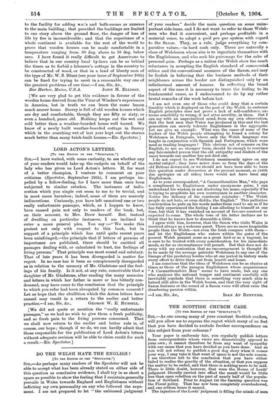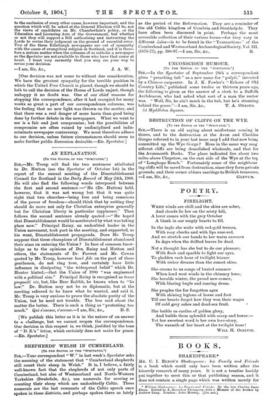Sni,—As one among many of your constant Scottish readers, will
you allow me to express the regret which many of us feel that you have decided to exclude further correspondence on this subject from your columns ?
Your paper is uniformly fair, you regularly publish letters from correspondents whose views are diametrically opposed to your own ; it cannot therefore be from any want of sympathy with our cause that you have decided as you have done. And as you will not refuse to publish a good dog story when it comes your way, I may take it that want of space is not the sole reason. I am therefore left to the conclusion that you have either failed to realise the gravity of the situation, or that you suppose the matter to be ended, and that there is nothing more to be said. There is little doubt, however, that were the House of Lords' judgment literally carried into effect the result would be little less than open rebellion on the part of nearly half of the popula- tion of Scotland. Prior to August 1st the burning question was the Fiscal policy. That has now been completely overshadowed, and one seldom hears it named.
The injustice of the Lords' judgment is filling the minds of amen
to the exclusion of every other cause, however important, and the question which will be asked at the General Election will be, not the views of candidates on Mr. Chamberlain's policy, or the Education and Licensing Acts of the Government, but whether or not they will support a Bill authorising and instructing the Lords to revise their judgment on the ground of essential error. Two of the three Edinburgh newspapers are out of sympathy with the cause of evangelical religion in Scotland, and it is there- fore a serious matter when the columns of so catholic a newspaper as the spectator are not available to those who have that cause at heart. I trust very earnestly that you may see your way to revise your decision.
which the United Free Church is placed, though we should be loth to call the decision of the House of Lords unjust, though unhappy it no doubt was. One of oar chief reasons for stopping the correspondence, after it had occupied for many weeks so great a part of our correspondence columns, was the feeling that no new light was thrown on the matter, and • that there was a real danger of more harm than good being done by further debate in the newspapers. What we want to see is a fair and just compromise; but the possibilities of compromise are often ruined by undisciplined and indis- criminate newspaper controversy. We must therefore adhere to our decision, unless future circumstances should seem to make further public discussion desirable.—En. Spectator.]











































 Previous page
Previous page